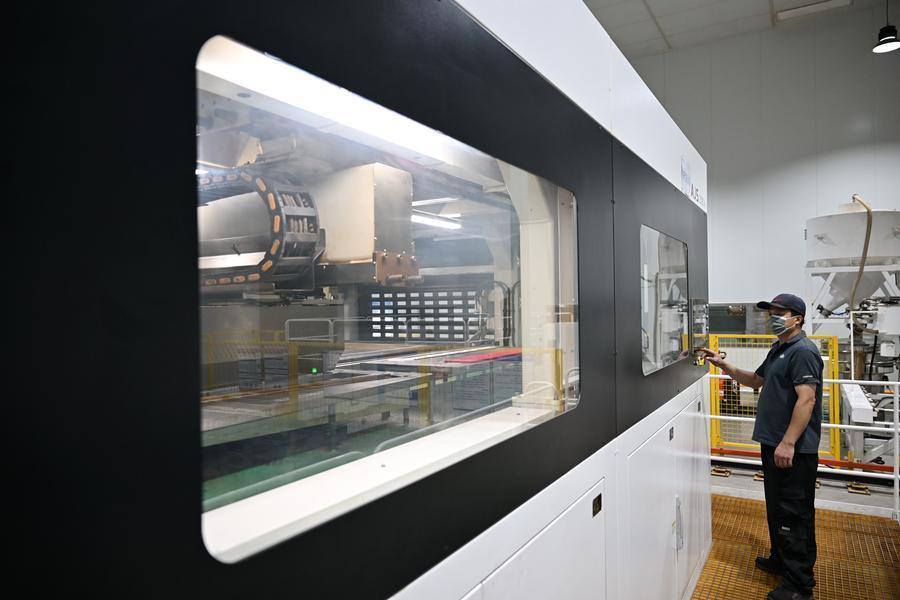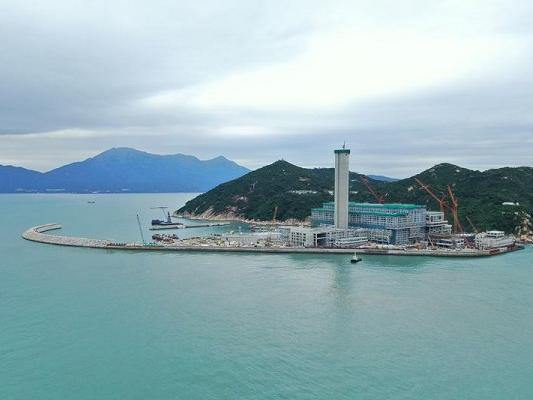
(Profile photo: VCG)
Within China’s spare parts industry, the spare parts industry of Zhejiang Province can be considered quite representative, and this is also a traditional competitive industry within Zhejiang Province.
The success of Zhejiang’s spare parts industry has benefited from the global manufacturing network. Because of Zhejiang’s huge market, excellent supply capacity, and abundant talent resources, multinational companies are willing to allocate more resources to the province.
Zhejiang's spare parts industry has gradually become an indispensable part of the global industry chain.
The popular concept being spread is that the battlefield of the first half of the fight against COVID-19 (from January to February) will be in China, while its second half (from March to April) will be that of the world, partly reflecting current trends in this pandemic.
This trend had also had a different impact on the two types of Zhejiang’s foreign-invested spare parts enterprises, which respectively are enterprises orienting towards the domestic Chinese market and international market-oriented enterprises.
Therefore, what is the current state of these two different types of enterprises? What are the opportunities and challenges facing them?
Generally speaking, Zhejiang’s foreign-funded spare parts enterprises are able to confidently cope with the epidemic situation. While cooperating with the local government on epidemic prevention, they are proactively adjusting their capacity and preventing their main research, development, and production processes from being interrupted.
During “the first half” of the fight against COVID-19, Zhejiang’s domestic-oriented foreign-invested spare parts enterprises have kept a firm footing.
Zhejiang’s spare parts enterprises are characterized by a comprehensive regional industrial chain and a strong regional market. Therefore, the spare parts enterprises mainly catering to the domestic market had a firm footing in the “first half” of the battle against COVID-19, when the epidemic was at its most serious within China.
Kayaku Safety Systems (Huzhou) Co., Ltd., which mainly produces gas generators for automobile airbags and safety belt retractors, hit a sales slump during the period from February to March when China was being hit hard by the coronavirus epidemic.
Fortunately, Kayaku Safety Systems' customers are concentrated in Jiangsu and Zhejiang Province, rather than in worse-hit areas like Hubei Province, the epicenter of the disease within China, allowing the company's losses to be relatively small.
Although the epidemic is now spreading worldwide, China's economy and society have taken the lead in the recovery. Multinational companies have also worked to rapidly restore Chinese markets and production capacity, and the spare parts industry will be restarting with a focus on the local market.
As China’s COVID-19 outbreak continues to be alleviated, factories have gradually resumed their operations. “We are now able to guarantee sufficient production for our customers,” said Sun Bin, head of the company’s Human Resource and General Affairs Department, “expanding the domestic market is our stated goal, and this outbreak is a reminder for our company.”
During “the second half” of the fight against COVID-19, Zhejiang’s international-oriented foreign-invested parts enterprises are seizing new opportunities.
“We resumed work in a safe and orderly manner beginning on February 10th under the guidance of the local government.
We were following the regulations of the government in an orderly and strict manner, both in terms of personnel control and in disinfection of the factory site,” said Huang Zhenling, deputy general manager of Zhejiang Yuzuan Precision Components Co., Ltd.
“In the beginning, only one-third of our staff returned to work. By the end of February, with the assistance of the local government, except for workers hailing from Hubei Province, about 80% of staff had returned to work across all our factory areas.”
This timely resumption of work has provided international-oriented foreign-funded spare parts companies in Zhejiang with advantages in their global competition.
Zhejiang Yuzuan Precision Components Co., Ltd., which mainly produces high-tech and high-precision hardware parts for optical instruments, the automotive industry, and other fields, is a supplier of major international enterprises.
“Compared to our competitors in Turkey, Germany, and India, our staff went back to work quickly, so many orders have reverted to our company, and our output value was rapidly lifted up,” said Huang Zhenling.
Zhejiang’s foreign-invested spare parts enterprises are resuming production in an orderly manner and doing their best to make up for the losses caused by this pandemic, but as the epidemic continues to spread abroad, the global supply chain is being disrupted, and the market is filled with contradictions and imbalances.
However, due to their integrated regional industrial chains and strong regional agglomeration effects, Zhejiang’s international-oriented foreign-funded spare parts enterprises have shown significant resilience during the coronavirus pandemic.
“The foreign industry chain is not as comprehensive as ours, “ said Huang Zhenling, “Using our existing resources, talent, and equipment, we try to achieve the largest share of supply, so that we can prevent the overall industry chain from being affected as much as possible. “
With sharp increases in front-line demand for epidemic response goods and acute shortages of supplies both at home and abroad, Yuzuan Precision Components is taking advantage of its reserves of medicals for producing medical equipment, has decisively chosen to support these medical systems’ needs for spare parts, and is making up the shortfall in epidemic response products and partly increasing its revenue during this outbreak.
“In addition to staying on top of quality control, we are also increasing production capacity to meet global epidemic prevention orders, “ Huang said.
It is apparent that both for domestically and internationally oriented companies, the impact of this pandemic on the Zhejiang spare parts industry is only temporary. During this pandemic, Zhejiang’s spare parts industry has shown impressive resilience, potential, and room for maneuver.
在中国零部件行业中,浙江零部件产业颇具代表性,也是浙江省传统的优势产业。
浙江零配件产业的成功得益于全球制造网络。浙江巨大的市场、优秀的供应能力和丰富的专家才能,使得跨国公司在全球制造网络中更多地将资源配置于浙江。浙江的零配件产业逐渐成为全球产业链条中不可缺少的一环。民间所谓一二月份中国打上半场,三四月份世界打下半场的戏言,一定程度上反映了当前疫情的发展态势。这种态势也对面向国内市场,面向国外市场两种不同类型的浙江外资配件企业造成了不同的影响。
那么现今,这两种不同市场指向的浙江的外资配件企业发展现状如何?遇到了哪些机遇和挑战?
总体上来看,目前浙江外资零部件企业尚能沉着应对,他们配合当地政府做好防疫的同时,积极进行产能调整,主要的生产和研发没有中断。
疫情”上半场”,面向国内市场的外资配件企业站稳脚跟
浙江零配件企业有着区域产业链完备和市场区域性较强的特点,因此主要面向国内市场的零配件企业在这场疫情的”上半场”——国内疫情严重时期,尚能够沉着应对。主要生产汽车安全气囊用气体发生器和安全带收卷固定器用气体发生器,面向国内汽车零部件销售市场的化药 (湖州) 安全器材有限公司(以下简称长兴化药),在国内疫情较为严重的二、三月份期间遇到了销量的低谷。
但所幸的是长兴化药的客户主要集中在浙江江苏地区,而不是中国疫情的震中湖北等地,因此该公司的损失较小。尽管现在全球疫情正在流行,但中国经济社会率先复苏,跨国公司在华市场和产能也率先复苏,浙江零配件产业将着力围绕本土市场先行重启。
现在随着国内疫情的好转,工厂的逐渐复工,” 我们现在是有能力给客户充足的生产保证的,” 该公司的人事总务部部长孙斌自信地说道,”扩大国内市场是我们的既定目标,这次的疫情也算是给了我们公司一个提醒。”
疫情”下半场”,面向国外市场的外资配件企业抓住机遇
“我们于2月10号在地方政府指导下实施安全、有序复工。不论是在人员的管控,还是在厂区的消毒,我们都在有序、严格地按照政府的规定来做”, 浙江宇钻精密元件有限公司的副总经理黄振陵说到”, 刚开始我们复工回来的人数只有三分之一,到二月底,在地方政府的协助之下,所有的厂区,除了湖北籍人员之外,复工率达到了80%。”
及时复工使得面向国际市场的浙江外资配件企业在全球竞争中占据优势。浙江宇钻精密元件有限公司主要生产高科技,高精密度之五金零件,产品涉及光学仪器,汽车工业等领域,为多家国际企业供货。“ 相较于我们在土耳其,德国,印度的竞争对手,我们复工快,所以许多订单都回流到了我们公司,我们的产值很快就被拉上去了。” 黄振陵说道。
浙江各地外资配件企业复工复产正在有序推进,尽力弥补因为疫情带来的损失,但由于疫情在国外持续蔓延,全球供应链因此遭遇寸寸截断,世界同此凉热。
然而,由于区域产业链完整,集聚效应强,面向国际市场的浙江外资配件企业在这次疫情中表现出了足够的韧性。
黄振陵说:“国外的产业链条并不像我们这么全面,我们利用我们现有的资源、人才和设备做到最大份额的供给,让整个产业链条尽量不受影响。” 面对国内国际第一线抗疫需求剧增,生产供应不上的情形,宇钻精密元件公司利用拥有生产医疗器材材料的优势,果断为其提供零部件支持,补足防疫产品需求缺口,在疫情下增加一些营收。
“我们在做好品质把关之外,也在加大产能,尽量满足全球防疫的订单,” 黄振陵说道。
可见,不论是面向国内市场还是面向国际市场,这次疫情对浙江配件产业的影响是暂时的,浙江零配件产业在这次疫情中展现了其产业韧性强、潜力大、回旋余地大的特点。
(Executive Editor: Ye Ke)




